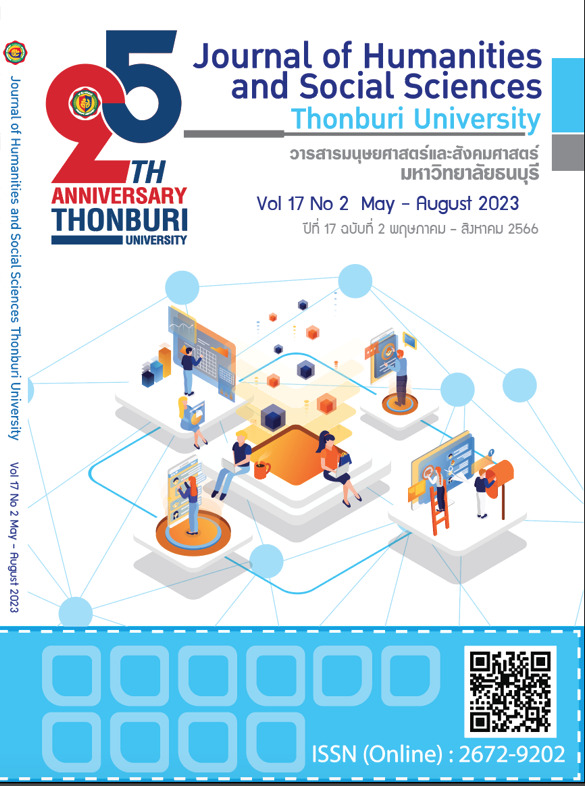The Exploratory Factor Analysis and Validity of the Practice Teacher’s Open-minded Measurement toward the New Normal Society
Keywords:
Exploratory factor analysis, Validation, Open-minded measurement, Practice TeacherAbstract
This research aims to analyze the exploratory factor and the validity of the practice teacher’s open-minded measurement toward the new normal society. The method of this research is multi-stage random sampling with 850 undergraduate practice teachers from nine universities. The result indicated that open-minded measurement toward the new normal society model consists of 4 factors; empathy, logical thinking, unbiased, and positive thinking, which explain the variance of variables at 75.8 %. From the calculation, average variance could be described by all factor variables in the model and unobserved variables reliability at 92.6%. The research outcome achieved the research objectives and was coherent with the hypothesis. Together these results provide important measurements for new practice teacher assessment toward open-mindedness which is considered an important characteristic of current teachers’s characteristic.
References
ฉัฐวีณ์ สิทธิ์ศิรอรรถ ไพรัตน์ จุ่นเกตุ นิษฐ์สินี กู้ประเสริฐ และวิษณุ แพทย์คดี. (2562). ผลการใช้กิจกรรมส่งเสริมความคิดเชิงบวกในนักศึกษาประกาศนียบัตรวิชาชีพครู. วารสารมนุษยศาสตร์และสังคมศาสตร์ มหาวิทยาลัยธนบุรี. 13(1), 146-153.
ดวงเดือน พันธุมนาวิน. (2559). การวิจัยทางจิตพฤติกรรมศาสตร์เพื่อการพัฒนาบุคคลและสังคม. งาน “สี่ทศวรรษใต้ร่มทฤษฎีต้นไม้จริยธรรม” วันที่ 25 พฤศจิกายน 2559 ณ โรงแรมรามาการ์เด้นส์. กรุงเทพฯ ประเทศไทย.
ดุจเดือน พันธุมนาวิน (2551). การวิจัยเพื่อพัฒนาเครื่องมือวัดทางจิตแบบพหุมิติด้านการมีภูมิคุ้มกันตน. วารสารจิตพฤติกรรมศาสตร์. 5 (1): 122-154.
นงลักษณ์ วิรัชชัย. (2542). ความสัมพันธ์โครงสร้างเชิงเส้น (Lisrel) สถิติวิเคราะห์สำหรับการวิจัยทางสังคมศาสตร์และพฤติกรรมศาสตร์. พิมพ์ครั้งที่ 3. กรุงเทพฯ: โรงพิมพ์จุฬาลงกรณ์มหาวิทยาลัย.
วชิรวิทย์ เอี่ยมวิลัย. (2563). การพัฒนาบอร์ดเกมตามแนวทางการคิดอย่างมีวิจารณญาณเพื่อส่งเสริมความเป็นพลเมืองดิจิทัลของนักเรียนชั้นมัธยมศึกษาปีที่ 1. ปริญญานิพนธ์ กศ.ม. (เทคโนโลยีทางการศึกษา). กรุงเทพฯ: มหาวิทยาลัยศรีนครินทรวิโรฒ.
วันชนะ รักพงษ์ไพบูลย์. (2561). การศึกษาความสัมพันธ์ระหว่างอคติโดยการมองโลกในแง่ดี (optimism bias) กับผลการประเมินการปฏิบัติงานของพนักงาน. กรุงเทพฯ : ปริญญานิพนธ์ มหาวิทยาลัยธรรมศาสตร์.
Bar-On, R. (2000). Emotional and Social Intelligence: Insights from the Emotional Quotient Inventory. In R. Bar-On, and J.D.A. Parker, (Eds.), The Handbook of Emotional Intelligence, 17, 363-388. Jossey-Bass, San Francisco.
Goleman, D. (1998). Working with Emotional Intelligence. New York : Bantam Books.
Janssen, E. M., Verkoeijen, P. P., Heijltjes, A. E., Mainhard, T., Van Peppen, L. M., & Van Gog, T. (2020). Psychometric Properties of the Actively Open-minded Thinking Scale. Thinking Skills and Creativity, 36, 100659.
Luthans, F., Youssef, C. M., & Avolio, B. J. (2007). Psychological Capital: Developing the human Competitive edge. Oxford, UK: Oxford University Press.
Martin, D. (2004). The Power of Positive Thinking. Retrieved April 8, 2004. Available: http://www.marin.cc.ca.us/~don/study/2positive.html.
Seligman, M. (1998). Learned Optimism. New York: Simon & Schuster Inc.
Shrestha, N. (2021). Factor Analysis as a Tool for Survey Analysis. American Journal of Applied Mathematics and Statistics, 9, 4-11.
Sitsira-at, S. (2020). AQ and EQ Related to Lifelong Learning of Undergraduate Students. ABAC ODI JOURNAL Vision. Action. Outcome, 7(1), 145-154.
Stanovich, K.E. & West, R.F. (2007). Natural Myside Bias is Independent of Cognitive Ability. Thinking & Reasoning, 13 (3), 225 – 247.
Ventrella, S.W. (2002). The Power of Positive Thinking in Business. London: Vermilion.
Translated Thai References
Bhanthumnavin, D. (2008). Research to Develop a Multi-level, Self-sufficient Psychological Measurement. Journal of Behavioral Science: Thai behavior System. 5 (1): 122-154. (in Thai)
Bhanthumnavin, D. (2016). Behavioral Science Research to Development of Individuals and Society. “Four Decades in the Shade of an Ethical Theory.” November 25, 2016. Rama Garden Hotel Bangkok, Thailand. (in Thai)
Eiamwilai, W. (2020). The Development of Board Game Based on Critical Thinking to Enhanced Digital Citizenship of 7th Grade Students. Bangkok: Srinakharinwirot University. (in Thai)
Rukphongpaiboon, W. (2018). The Study of Relationship between Optimism Bias and Performance Appraisal of Employees. Bangkok: Thammasat University Theses. (in Thai)
Sitsira-at, S., Jungate, P., Kuprasert, N. & Peatkadee, V. (2019). The Effects of Positive Thinking Enhancing Activities in Graduate Diploma Program in Teaching Profession Students. Journal of Humanities and Social Sciences Thonburi University. 13(1), 146-153. (in Thai)
Wiratchai, N. (1999). Lisrel: Statistical Analysis for Social Science Research and Behavioral Sciences. 3rded. Bangkok: Chulalongkorn University Printing. (in Thai)
Downloads
Published
How to Cite
Issue
Section
License
Copyright (c) 2023 Shuttawwee Sitsira-at

This work is licensed under a Creative Commons Attribution-NonCommercial-NoDerivatives 4.0 International License.
ผลงานที่ปรากฎในวารสารฉบับนี้เป็นลิขสิทธิ์เฉพาะส่วนบุคคลของผู้เขียนซึ่งต้องรับผิดชอบต่อผลทาง กฎหมายที่อาจเกิดขึ้นได้และไม่มีผลต่อกองบรรณาธิการ






